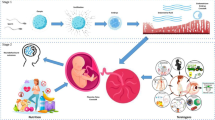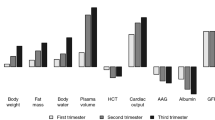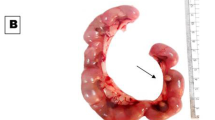Abstract
Objectives
To estimate the effects and mechanisms of choline, an essential nutrient and a selective α7 nicotinic acetylcholine receptor (α7nAChR) agonist, on the prevention of symptoms and the effects on the cholinergic anti-inflammatory pathways (CAP) in a lipopolysaccharide (LPS)-induced inflammatory response in a rat model.
Methods
Inflammation was induced by LPS treatment (1.0 µg LPS/kg body weight) on gestational day (GD) 14. Nonpregnant and pregnant Sprague Dawley rats were placed on a normal choline diet (1.1 g/kg) or supplemented choline diet (5.0 g/kg) from GDs 1 to 20. Systolic blood pressure (SBP), urinary albumin, and pregnancy outcomes were recorded. On GD 20, serum and placentas were assayed for cytokines. Western blots were used to determine the expression of placenta α7nAChR and components of the α7nAChR-CAP, including nuclear factor-κB (NF-κB) and protein kinase B (AKT). Immunohistochemistry was used to localize placental sites for the p65 subunit of NF-κB.
Results
Lipopolysaccharide significantly increased SBP and urinary albumin and decreased pregnancy outcomes, and these effects were partially reversed by higher choline treatment. Choline supplementation also significantly attenuated the LPS-induced increase in serum and placental inflammatory cytokines, decreased the expression of placental α7nAChR, lowered the activation of NF-κB signaling in placenta mononuclear cells, and inhibited placental AKT phosphorylation.
Conclusion
This study confirms that LPS induces inflammatory conditions in pregnant rats and shows that choline supplementation protects against the inflammatory symptoms through its action on α7nAChR and CAP. These observations have important implications for the prevention and treatment of inflammatory responses associated with pregnancy.
Similar content being viewed by others
References
Challis JR, Lockwood CJ, Myatt L, Norman JE, Strauss JF, Petraglia F. Inflammation and pregnancy. Reprod Sci. 2009;16(2):206–215.
Szarka A, Rigó J Jr, Lazar L, Beko G, Molvarec A. Circulating cytokines, chemokines and adhesion molecules in normal pregnancy and preeclampsia determined by multiplex suspension array. BMC Immunol. 2010;11:59.
Sacks GP, Studena K, Sargent K, Redman CW. Normal pregnancy and preeclampsia both produce inflammatory changes in peripheral blood leukocytes akin to those of sepsis. Am J Obstet Gynecol. 1998;179(1):80–86.
Tosun M, Celik H, Avci B, Yavuz E, Alper T, Malatyalioglu E. Maternal and umbilical serum levels of interleukin-6, interleukin-8, and tumor necrosis factor-alpha in normal pregnancies and in pregnancies complicated by preeclampsia. J Matern Fetal Neonatal Med. 2010;23(8):880–886.
Laham NK, Brennecke SP, Rice GE. Interleukin-8 release from human gestational tissue explants: the effects of lipopolysaccharide and cytokines. Biol Reprod. 1997;57(3):616–620.
Munro SK, Mitchell MD, Ponnampalam AP. Histone deacetylase inhibition by trichostatin A mitigates LPS induced TNF alpha and IL-10 production in human placental explants. Placenta. 2013;34(7):567–573.
Straley ME, Togher KL, Nolan AM, Kenny LC, O’Keeffe GW. LPS alters placental inflammatory and endocrine mediators and inhibits fetal neurite growth in affected offspring during late gestation. Placenta. 2014;35(8):533–538.
Lee J, Romero R, Xu Y, et al. A signature of maternal anti-fetal rejection in spontaneous preterm birth: chronic chorioamnionitis, anti-human leukocyte antigen antibodies, and C4d. PLoS One. 2011;6(2):e16806.
Shynlova O, Roderique TN, Li Y, Dorogin A, Nguyen T, Lye SJ. Infiltration of myeloid cells into decidua is a critical early event in the labour cascade and post-partum uterine remodelling. J Cell Mol Med. 2013;17(2):311–324.
Watari M, Watari H, DiSanto ME, Chacko S, Shi GP, Strauss JF. Proinflammatory cytokines induce expression of matrix-metabolizing enzymes in human cervical smooth muscle cells. Am J Pathol. 1999;154(6):1755–1762.
Buhimschi IA, Buhimschi CS, Weiner CP. Protective effect of N-acetylcysteine against fetal death and preterm labor induced by maternal inflammation. Am J Obstet Gynecol. 2003;188(1):203–208.
Yang J, Shi SQ, Shi L, Fang D, Liu H, Garfield RE. Nicotine, an alphα7 nAChR agonist, reduces lipopolysaccharide-induced inflammatory responses and protects fetuses in pregnant rats. Am J Obstet Gynecol. 2014;211(5):538.e1–7.
Faas MM, Schuiling GA, Baller JF, Visscher CA, Bakker WW. A new animal model for human preeclampsia: ultra-low-dose endo-toxin infusion in pregnant rats. Am J Obstet Gynecol. 1994;171(1):158–164.
Huang Q, Liu L, Hu B, Di X, Brennecke SP, Liu H. Decreased seizure threshold in an eclampsia-like model induced in pregnant rats with lipopolysaccharide and pentylenetetrazol treatments. PLoS One. 2014;9(2):e89333.
Bao J, Liu Y, Yang J, et al. Nicotine inhibits LPS-induced cyto-kine production and leukocyte infiltration in rat placenta. Placenta. 2016;39:77–83.
Li X, Han X, Bao J, et al. Nicotine increases eclampsia-like seizure threshold and attenuates microglial activity in rat hippo-campus through the α7 nicotinic acetylcholine receptor. Brain Res. 2016;1642:487–496.
Liu Y, Yang J, Bao J, et al. Activation of the cholinergic anti-inflammatory pathway by nicotine ameliorates lipopolysaccharide-induced preeclampsia-like symptoms in pregnant rats. Placenta. 2017:49:23–32.
Zeisel SH. Choline: critical role during fetal development and dietary requirements in adults. Ann Rev Nutr. 2006;26:229–250.
Mehta AK, Singh BP, Arora N, Gaur SN. Choline attenuates immune inflammation and suppresses oxidative stress in patients with asthma. Immunobiology. 2010;215(7):527–534.
Da Costa KA, Niculescu MD, Craciunescu CN, Fischer LM, Zeisel SH. Choline deficiency increases lymphocyte apoptosis and DNA damage in humans. Am J Clin Nutr. 2006;84(1):88–94.
Mehedint MG, Craciunescu CN, Zeisel SH. Maternal dietary choline deficiency alters angiogenesis in fetal mouse hippocampus. Proc Natl Acad Sci USA. 2010;107(29):12834–12839.
Zeisel SH. The fetal origins of memory: the role of dietary choline in optimal brain development. J Pediatr. 2006;149(Suppl 5): 131–136.
Yan J, Jiang X, West AA, et al. Maternal choline intake modulates maternal and fetal biomarkers of choline metabolism in humans. Am J Clin Nutr. 2012;95(5):1060–1071.
Caudill MA. Pre- and postnatal health: evidence of increased choline needs. J Am Diet Assoc. 2010;110(8):1198–1206.
Zeisel SH, Da Costa KA, Franklin PD, et al. Choline, an essential nutrient for humans. FASEB J. 1991;5(7):2093–2098.
Fischer LM, da Costa KA, Kwock L, Galanko J, Zeisel SH. Dietary choline requirements of women: effects of estrogen and genetic variation. Am J Clin Nutr. 2010;92(5):1113–1119.
Fischer LM, daCosta K, Kwock L, et al. Sex and menopausal status influence human dietary requirements for the nutrient choline. Am J Clin Nutr. 2007;85(5):1275–1285.
Da Costa KA, Badea M, Fischer LM, Zeisel SH. Elevated serum creatine phosphokinase in choline-deficient humans: mechanistic studies in C2C12 mouse myoblasts. Am J Clin Nutr. 2004;80(1):163–170.
Buchman AL, Ament ME, Sohel M, et al. Choline deficiency causes reversible hepatic abnormalities in patients receiving parenteral nutrition: proof of a human choline requirement: a placebo-controlled trial. J Parenteral Enteral Nutrition. 2001;25(5):260–268.
Jiang X, Bar HY, Yan J, et al. A higher maternal choline intake among third-trimester pregnant women lowers placental and circulating concentrations of the antiangiogenic factor fms-like tyrosine kinase-1 (sFLT1). FASEB J. 2013;27(3):1245–1253.
Jiang X, Yan J, West AA, et al. Maternal choline intake alters the epigenetic state of fetal cortisol-regulating genes in humans. FASEB J. 2012;26(8):3563–3574.
Ganley OH, Graessle OE, Robinson HJ. Anti-inflammatory activity of components obtained from egg-yolk, peanut oil and soyabean lecithin. J Lab Clin Med. 1958;51(5):709–714.
Mehta AK, Arora N, Gaur SN, Singh BP. Choline supplementation reduces oxidative stress in mouse model of allergic airway disease. Eur J Clin Invest. 2009;39(10):934–941.
Velazquez R, Ash JA, Powers BE, et al. Maternal choline supplementation improves spatial learning and adult hippocampal neurogenesis in the Ts65Dn mouse model of Down syndrome. Neurobiol Dis. 2013;58:92–101.
Meck WH, William CL, Cermak JM, Blusztajn JK. Developmental periods of choline sensitivity provide an ontogenetic mechanism for regulating memory capacity and age-related dementia. Front Integr Neurosci. 2007;1:1–7.
American College of Obstetricians and Gynecologists task force on hypertension in pregnancy, hypertension in pregnancy [online]. 2013:1–89. http://www.acog.org/resources_and_publications/task_force_and_work_group_reports/hypertension_in_preg nancy. Accessed May 16, 2016.
Kojima H, Ito K, Tsubone H, Kuwahara M. Nicotine treatment reduces LPS-induced sickness responses in telemetry monitoring rats. J Neuroimmunol. 2011;234(1–2):55–62.
Pavlov VA, Ochani M, Yang LH, et al. Selective alphα7-nicotinic acetylcholine receptor agonist GTS-21 improves survival in murine endotoxemia and severe sepsis. Crit Care Med. 2007;35(4):1139–1144.
Detopoulou P, Panagiotakos DB, Antonopoulou S, Pitsavos C, Stefanadis C. Dietary choline and betaine intakes in relation to concentrations of inflammatory markers in healthy adults: the ATTICA study. Am J Clin Nutr. 2008;87(2):424–430.
Hu B, Yang J, Huang Q, Bao J, Brennecke S P, Liu H. Cyclosporin A significantly improves preeclampsia signs and suppresses inflammation in a rat model. Cytokine. 2016;81:77–81.
Pinheiro MB, Martins OA, Mota AP, et al. Severe preeclampsia goes along with a cytokine network disturbance towards a systemic inflammatory state. Cytokine. 2013;62(1):165–173.
Tinsley JH, South S, Chiasson VL, Mitchell BM. Interleukin-10 reduces inflammation, endothelial dysfunction, and blood pressure in hypertensive pregnant rats. Am J Physiol. 2010;298(3):713–719.
Chatterjee P, Chiasson VL, Bounds KR, Mitchell BM. Regulation of the anti-inflammatory cytokines interleukin-4 and interleukin-10 during pregnancy. Front Immunol. 2014;5:1–6.
Tracey KJ. Physiology and immunology of the cholinergic anti-inflammatory pathway. J Clin Invest. 2007;117(2):289–296.
Lips KS, Bruggmann D, Pfeil U, Vollerthun R, Grando SA, Kummer W. Nicotinic acetylcholine receptors in rat and human placenta. Placenta. 2005;26(10):735–746.
Guseva MV, Hopkins DM, Scheff SW, Pauly JR. Dietary choline supplementation improves behavioral, histological, and neuro-chemical outcomes in a rat model of traumatic brain injury. J Neurotrauma. 2008;25(8):975–983.
Stevens KE, Choo KS, Stitzel JA, Marks MJ, Adams CE. Long-term improvements in sensory inhibition with gestational choline supplementation linked to α7 nicotinic receptors through studies in Chrnα7 null mutation mice. Brain Res. 2014;1552:26–33.
Bencherif M, Lippiello PM, Lucas R, Marrero MB. Alphα7 nicotinic receptors as novel therapeutic targets for inflammation-based diseases. Cell Mol Life Sci. 2011;68(6):931–949.
Sharentuya N, Tomimatsu T, Mimura K, et al. Nicotine suppresses interleukin-6 production from vascular endothelial cells: a possible therapeutic role of nicotine for preeclampsia. Reprod Sci. 2010;17(6):556–563.
Saeed RW, Varma S, Peng-Nemeroff T, et al. Cholinergic stimulation blocks endothelial cell activation and leukocyte recruitment during inflammation. J Exp Med. 2005;201(7):1113–1123.
Chen Y, Zhao M, Chen X, et al. Zinc supplementation during pregnancy through its anti-inflammatory effect. J Immunol. 2012;189(1):454–463.
Ozes ON, Mayo LD, Gustin JA, Pfeffer SR, Pfeffer LM, Donner DB. NF-kappaB activation by tumour necrosis factor requires the Akt serine-threonine kinase. Nature. 1999;401(6748):82–85.
Yue Y, Liu R, Cheng W, et al. GTS-21 attenuates lipopolysaccharide-induced inflammatory cytokine production in vitro by modulating the Akt and NF-κB signaling pathway through the α7 nicotinic acetylcholine receptor. Int Immunopharmacol. 2015;29(2):504–512.
Kovacheva VP, Davison JM, Mellott TJ, et al. Raising gestational choline intake alters gene expression in DMBA evoked mammary tumors and prolongs survival. FASEB J.2009;23(4):1054–1063.
Author information
Authors and Affiliations
Corresponding author
Rights and permissions
About this article
Cite this article
Zhang, M., Han, X., Bao, J. et al. Choline Supplementation During Pregnancy Protects Against Gestational Lipopolysaccharide-Induced Inflammatory Responses. Reprod. Sci. 25, 74–85 (2018). https://doi.org/10.1177/1933719117702247
Published:
Issue Date:
DOI: https://doi.org/10.1177/1933719117702247




